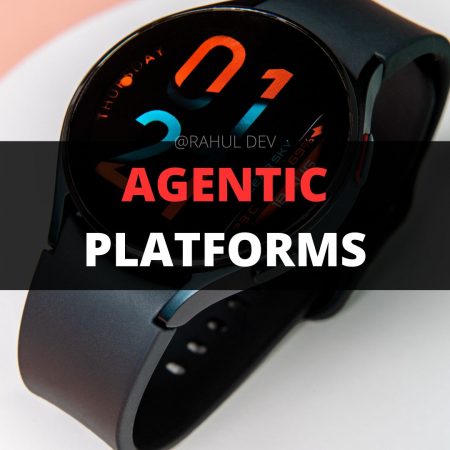Agentic Platforms
Insights by Dr. Rahul Dev

Understand Practical Aspects
Understand the process of launching Agentic Platforms

Insights by Dr. Rahul Dev

Understand the process of launching Agentic Platforms

Protect your innovations across multiple countries and create strong patent portfolio to boost business valuation
Local and global brand protection through international trademark registrations
Extensive research and business writing for technical whitepapers and B2B content products
Agentic platforms represent the most transformative shift in enterprise software architecture since the advent of cloud computing. These intelligent systems employ autonomous agents that perceive, reason, and act independently across complex business environments, fundamentally changing how enterprises operate. Unlike traditional software that follows predetermined rules, agentic platforms break down high-level objectives into executable tasks, adapt strategies in real-time, and seamlessly integrate with existing enterprise infrastructure.
The global market for these AI-powered enterprise software solutions reached $1.4 billion in 2022 and is projected to explode to $12.8 billion by 2027, representing a 54.5% compound annual growth rate. This unprecedented growth reflects enterprise demand for systems that move beyond static automation toward truly adaptive AI systems. Major corporations like Walmart already leverage agentic AI to dynamically adjust inventory based on weather patterns and local events, demonstrating the practical power of autonomous decision-making at scale.
Building a scalable agentic platform company requires understanding the fundamental architectural shifts that distinguish these systems from traditional SaaS offerings. Where conventional enterprise tools operate within rigid parameters, agentic architectures enable distributed intelligence that evolves with usage. This article provides a comprehensive roadmap for launching an agentic platform company, covering essential architectural requirements, integration strategies, governance frameworks, and the competitive advantages that position these platforms as the future of enterprise software.
An agentic platform fundamentally differs from traditional enterprise software through its ability to perceive environments, reason through complex scenarios, and execute actions autonomously. These intelligent business platforms employ multiple cooperating agents that coordinate workflows across enterprise systems without constant human intervention. Each agent operates as an independent entity capable of breaking down abstract goals into concrete, executable steps while maintaining awareness of the broader operational context.
The architecture of modern agentic platforms centers on five core capabilities that enable true autonomy. First, perception systems intake data from multiple sources including APIs, databases, and real-time sensors, extracting relevant features for decision-making. Second, reasoning engines leverage large language models and specialized functions to analyze situations and plan optimal action sequences. Third, execution layers interface directly with enterprise applications to implement decisions. Fourth, learning mechanisms continuously improve performance through feedback loops. Finally, collaboration protocols enable multiple agents to coordinate complex, multi-step processes across organizational boundaries.
Consider how customer service transforms with agentic implementation versus traditional chatbots. Where scripted bots follow decision trees, AI agents autonomously manage account balances, generate personalized financial advice, and complete complex transactions. These agents understand context, remember previous interactions, and adapt their approach based on customer behavior patterns. This level of sophistication requires architectural foundations that support real-time adaptation while maintaining enterprise-grade security and compliance standards.
Building a scalable agentic platform company begins with establishing a modular, vendor-neutral architecture that avoids the pitfalls of monolithic systems. The foundation requires implementing what industry leaders call an “agentic AI mesh”, a composable environment where agents, tools, and language models interconnect flexibly. This approach enables rapid scaling while maintaining system stability as new capabilities integrate into the platform.
A successful agentic platform development follows a structured implementation pathway that balances innovation with practical constraints. Start by defining clear use cases that demonstrate immediate value to enterprise customers, such as intelligent data orchestration or automated workflow optimization. Next, design agent behaviors with embedded governance policies that limit autonomous actions within acceptable risk parameters. For instance, financial services agents might require human approval for transactions exceeding predetermined thresholds, ensuring responsible automation while maximizing efficiency gains.
Technical architecture must prioritize interoperability through open standards like Model Context Protocol (MCP) and Agent2Agent (A2A) protocols. These standards enable seamless SaaS integration while preventing vendor lock-in that plagues traditional enterprise software. Leading platforms implement layered decoupling that separates decision logic, memory systems, orchestration engines, and user interfaces. This modular approach allows independent updates to system components without disrupting overall functionality, critical for maintaining service reliability during rapid scaling phases.
As someone who has guided multiple AI startups through international patent filing processes, I’ve observed that successful agentic platform companies invest heavily in intellectual property protection early. Patent applications for adaptive AI systems require careful claim drafting that captures both the technical innovation and practical business applications. Companies should file provisional patents covering core agent orchestration methods, adaptive learning algorithms, and novel integration approaches before public disclosure or customer deployments.
The landscape of agentic platform providers divides into established cloud giants enhancing existing offerings and innovative startups building specialized solutions. Google Cloud AI Platform, Microsoft Azure Machine Learning, and Amazon SageMaker have all incorporated agentic capabilities into their enterprise offerings. These platforms leverage existing infrastructure advantages while adding autonomous enterprise systems features that enable dynamic workflow orchestration and intelligent resource allocation.
The emerging companies differentiate through specialized agent implementations targeting specific industry verticals or operational challenges. Financial services platforms focus on risk assessment and transaction automation, while supply chain solutions emphasize real-time adaptation to market conditions. The most successful platforms share common architectural patterns including distributed agent coordination, robust API ecosystems, and enterprise-grade security frameworks that address data sovereignty and compliance requirements.
The evaluation criteria for selecting agentic platform solutions should prioritize scalability, integration flexibility, and governance capabilities. Platforms must demonstrate ability to handle concurrent agent operations across distributed environments without performance degradation. Integration assessment should verify compatibility with existing enterprise systems through standard protocols and APIs. Governance features must include policy enforcement mechanisms, audit trails, and configurable autonomy limits that align with organizational risk tolerance.
Integrating agentic platforms with existing SaaS ecosystems presents unique technical and operational challenges that require sophisticated orchestration strategies. Traditional point-to-point integrations fail to capture the dynamic nature of agent-based workflows that span multiple systems. Instead, successful implementations employ event-driven architectures that enable agents to respond to changes across the entire enterprise technology stack in real-time.
The modern integration approaches leverage AI SaaS platforms capabilities through three primary patterns that ensure seamless interoperability. First, API aggregation layers provide unified access to disparate systems while handling authentication, rate limiting, and data transformation. Second, event streaming infrastructures enable real-time data flow between agents and enterprise applications. Third, semantic translation services ensure consistent data interpretation across systems with different schemas and formats. These patterns work together to create a cohesive operational environment where agents move fluidly between systems.
Security considerations for SaaS integration extend beyond traditional access controls to address new risks introduced by autonomous agents. Data poisoning attacks attempt to manipulate input streams to influence agent decisions, requiring robust validation mechanisms at integration points. Denial-of-service vulnerabilities emerge when agents depend on external services, necessitating fallback strategies and redundant data sources. My experience drafting technology licensing agreements for AI platforms emphasizes the importance of clearly defining data usage rights, liability boundaries, and security responsibilities across integrated systems.
The distinction between agentic platforms and traditional enterprise tools extends beyond technical capabilities to fundamental operational philosophy. Traditional tools excel at automating repetitive, well-defined processes through rigid workflows and rule-based logic. These systems provide predictability and control but struggle with dynamic environments requiring adaptive responses. Agentic platforms invert this paradigm by prioritizing flexibility and autonomous decision-making within governed parameters.
The performance metrics highlight the transformative impact of agentic architectures on enterprise operations. Where traditional automation might reduce processing time by 30-40%, agentic systems achieve 70-80% improvements through intelligent task prioritization and parallel execution. More significantly, agentic platforms reduce the need for human intervention in complex decision-making scenarios by 60%, freeing knowledge workers to focus on strategic initiatives rather than operational management.
A successful enterprise AI platform deployment requires carefully orchestrated change management that addresses technical, organizational, and cultural dimensions simultaneously. Technical implementation should follow phased rollouts beginning with low-risk, high-visibility use cases that demonstrate value quickly. Initial deployments might focus on intelligent automation platform capabilities for routine tasks before expanding to complex decision-making scenarios. This graduated approach builds organizational confidence while allowing technical teams to refine agent behaviors based on real-world performance.

As a business coach and thought leader, I cannot emphasize enough the importance of innovation, new software patents, mobile apps, and patents for tech companies, startups, and entrepreneurs. The world is rapidly evolving, and staying ahead of the curve is vital for success. Embracing technological advancements such as blockchain and AI can unlock unprecedented opportunities, streamline operations, and propel businesses into the future with competitive valuation via intangible assets.
Click Here for AI Startup Valuation Guide.
For instance, blockchain technology can revolutionize supply chain management and secure data sharing wherein innovative business models are explained to the audience via technical whitepapers, while AI can automate and optimize decision-making processes. Mobile apps are no longer just a luxury; they have become essential tools for engaging customers and offering personalized experiences. Furthermore, securing digital innovation patents is crucial for protecting intellectual property, fostering innovation, and maintaining a competitive edge. By investing in these areas, businesses can position themselves as industry pioneers and pave the way for a prosperous future after thoroughly conducting the due diligence and reviewing the legal opinion letters, which in case of digital assets can assist in determining the tokens as utility assets or coins as utility tokens before listing the assets at an exchange.
Our team of advanced patent attorneys assists clients with patent searches, drafting patent applications, and patent (intellectual property) agreements, including licensing and non-disclosure agreements. Advocate Rahul Dev is a Patent Attorney & International Business Lawyer practicing Technology, Intellectual Property & Corporate Laws. He is reachable at rd (at) patentbusinesslawyer (dot) com & @rdpatentlawyer on Twitter.
Quoted in and contributed to 50+ national & international publications (Bloomberg, FirstPost, SwissInfo, Outlook Money, Yahoo News, Times of India, Economic Times, Business Standard, Quartz, Global Legal Post, International Bar Association, LawAsia, BioSpectrum Asia, Digital News Asia, e27, Leaders Speak, Entrepreneur India, VCCircle, AutoTech).
Regularly invited to speak at international & national platforms (conferences, TV channels, seminars, corporate trainings, government workshops) on technology, patents, business strategy, legal developments, leadership & management.
Working closely with patent attorneys along with international law firms with significant experience with lawyers in Asia Pacific providing services to clients in US and Europe. Flagship services include international patent and trademark filings, patent services in India and global patent consulting services.
Global Blockchain Lawyers (www.GlobalBlockchainLawyers.com) is a digital platform to discuss legal issues, latest technology and legal developments, and applicable laws in the dynamic field of Digital Currency, Blockchain, Bitcoin, Cryptocurrency and raising capital through the sale of tokens or coins (ICO or Initial Coin Offerings).
Blockchain ecosystem in India is evolving at a rapid pace and a proactive legal approach is required by blockchain lawyers in India to understand the complex nature of applicable laws and regulations.